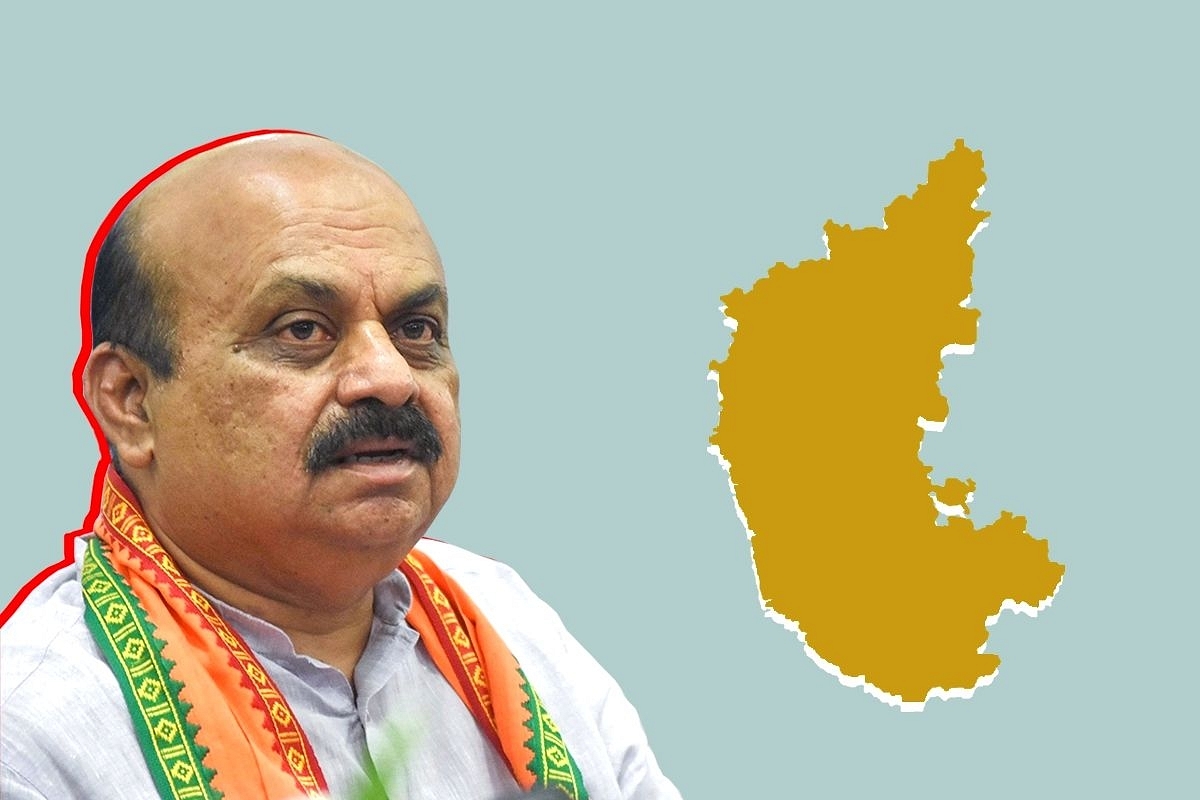News Brief
Karnataka: Opposition Congress Leaders Resist Efforts To Free Hindu Temples As Government Assures Draft Before Budget Session
- Karnataka BJP gets ready to act on its 2018 election manifesto to free Hindu temples from government control, before the next budget session.
- Opposition leaders reduce it to a 'caste' issue, and vow to resist the move.

Karnataka Chief Minister Basavaraj Bommai.
While Hindus in Karnataka rejoiced at the announcement by Chief Minister Basavaraj Bommai last week to free Hindu temples from excessive rules and administrative hassles, opposition parties have been vocal about their resistance to this proposition.
Bharatiya Janata Party (BJP) in Karnataka in its 2018 election manifesto had promised to free Hindu temples from government control, and this announcement to act on it before the next budget session comes as the government inches towards the completion of its term.
But opposition leaders have been trying to turn the issue into a casteist one calling it an attempt by saffron organisations to take over the temples and hand it over to a small section of upper caste Hindus.
Former chief minister and Congress leader Siddharamaiah tweeted a series of messages saying the move goes against the people and that this is an attempt to deny religious rights guaranteed to the last man standing by a democratic republic and to hand it over to a select few.
Karnataka Pradesh Congress Committee (KPCC) president D K Shivakumar had earlier called the temples a rich source of revenue for the state coffers which have been greatly depleted during the Covid crisis. He added that releasing the temples from government control would only worsen the situation.
The two top leaders of the Congress have also been trying to paint the attempt by the BJP to free temples as a pro-Brahmin move and one that would mete out injustice to other castes on one hand, and on the other, a sinister ploy to use the wealth and earnings of the temples ‘some of which are in crores’ by a ’certain section’ alone.
"The very forces who destroyed the Sharana movement led by Basavanna are the ones who are at the forefront of this and are using the ‘Shudra‘ leaders within the party to push more than 5.5 crore Kannadiga Hindus to religious slavery," accused Siddharamaiah in a thread tweeted earlier this week.
He also said the allegations that temple money had been used for development of churches and mosques were all false, and that the department of Muzrai had responded to his query saying not a single rupee of the temple money had been used for any churches or mosques.
He alleged that the evil eye of one section had fallen on the treasures of the state’s temples and that the dharmic mafia that runs its business in the name of god wishes to take away the temples from 80 per cent of the population that are Hindus and hand it over to just 2 to 3 per cent.
A total of 34,563 temples in the state come under Muzrai (Hindu religious endowment) department that have been categorised as grade A, B and C, based on their revenue generation.
A total of 207 temples with annual revenue of above Rs 25 lakh come under category A, 139 temples between Rs 5 lakh to Rs 25 lakh come under category B, and 34,217 temples with less than Rs 5 lakh annual revenue under category C.
But less than a week after he accused the priestly class of taking over the reins of temple administration, he was seen tweeting about representatives of an association of temple priests visiting him to request him to force the government to give up the decision of freeing temples. Interestingly, this organisation is headed by senior Congress leader and former KPCC president Dinesh Gundu Rao.
BJP’s national general secretary and Karnataka‘s former culture Minister C T Ravi slammed the Congress for opposing the bill and said the party has never had the mindset to solve any issues affecting the majority community.
“The British brought temples under their control not out of respect but to obtain the income generated by them,” he remarked. Responding to Shivakumar’s earlier statement, Ravi added that the state government doesn't need to be run by temple incomes. “D K Shivakumar must understand that income from temples doesn't belong to the government. It’s the property of the people and temples,” he added as quoted.
Introducing ElectionsHQ + 50 Ground Reports Project
The 2024 elections might seem easy to guess, but there are some important questions that shouldn't be missed.
Do freebies still sway voters? Do people prioritise infrastructure when voting? How will Punjab vote?
The answers to these questions provide great insights into where we, as a country, are headed in the years to come.
Swarajya is starting a project with an aim to do 50 solid ground stories and a smart commentary service on WhatsApp, a one-of-a-kind. We'd love your support during this election season.
Click below to contribute.
Latest